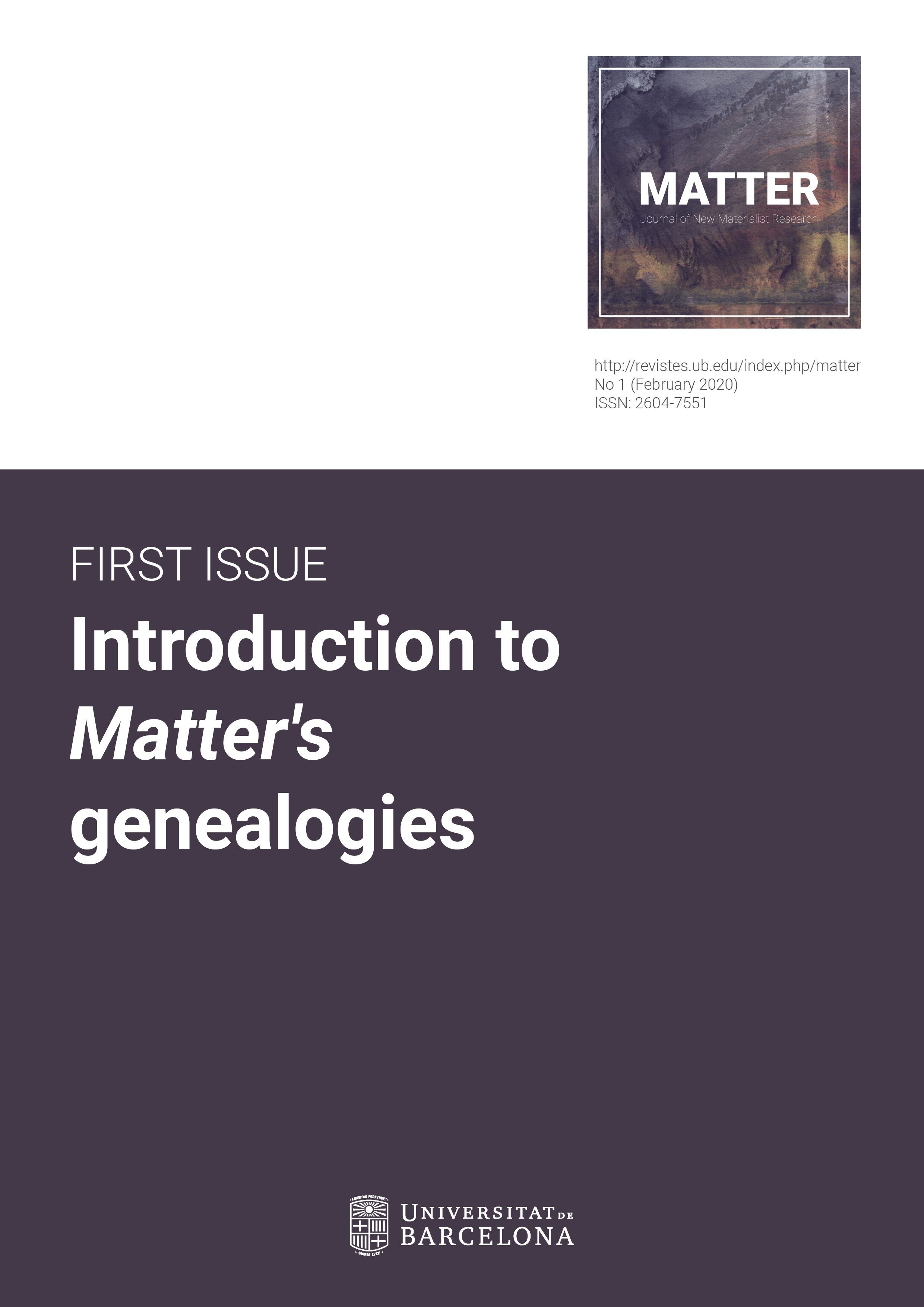Doing new materialisms: an interview with Maria Tamboukou
DOI:
https://doi.org/10.1344/jnmr.v1i1.30290Abstract
Including an interview as part of the special issue responds to one specific question that has to do with the production of scientific knowledge. During the Training School, the context in which the current special issue is framed, we highlighted the importance of creating inter-generational knowledges able to transverse across disciplines and the historicity of matter itself. The interview that we are transcribing in this journal represents this specific moment between Beatriz Revelles-Benavente (co-editor and co-organizer of the Training School together with Ana M. González) and Maria Tamboukou, a recognized scholar on new materialist methodologies.
Downloads
References
Alaimo Stacy and Heckman Susan (2008). (Eds) Material Feminisms. Bloomington: Indiana University Press.
Arendt, Hannah (1998) [1958]. The Human Condition. Chicago: The University of Chicago Press.
Bakhtin, Mihail (1981). The dialogic Imagination ed. by M. Holquist, Austin: University of Texas Press.
Barad, Karen (2007). Meeting the Universe Halfway: Quantum Physics and the Entanglement of Matter and Meaning. Durham: Duke University Press.
Bergson, Henri (2002) [1893]. Matter and Memory. Translated from the French by Nancy M. Paul and W. Scott Palmer. New York: Zone Books.
Braidotti, Rosi. (2013). The Posthuman. Cambridge: Polity Press.
Cavarero, Adriana (2000). Relating Narratives: storytelling and selfhood, translated by Paul, A. Kottman. London, Routledge.
Debaise, Didier (2017). Nature as Event: The Lure of the Possible, M. Halewood, trans., Durham: Duke University Press.
DeLanda, Manuel (2006). A New Philosophy of Society: Assemblage Theory and Social Complexity. London: Continuum.
De Lauretis, Theresa (1988). Desire in Narrative. In Alice Doesn’t : Feminism, Semiotics, Cinema. London: Macmillan.
Deleuze, Gilles (2004). Difference and Repetition. Translated by Paul Patton. London: Continuum.
Deleuze, Gilles & Guattari, Felix (1988). [1980] A Thousand Plateaus: Capitalism and Schizophrenia, translated by Brian Massumi. London: The Athlone Press.
Elliot, Jane (2005). Using Narrative in Social Research: Qualitative and Quantitative Approaches, London, Sage.
Ferguson Kathy (2017). Feminist Theory Today. The Annual Review of Political Science, 20:14.1–14.18, doi: 10.1146/annurev-polisci-052715-111648.
Foucault, Michel (1986). Nietzsche, Genealogy, History. Trans. Donald.F. Bouchard and S. Simon. In: Paul Rabinow, Ed. The Foucault Reader, Harmondsworth: Peregrine, 76-100.
Fox, Nick & Alldred, Pam (2015). New materialist social inquiry: designs, methods and the research-assemblage. International Journal of Social Research Methodology, 18 (4), 399-414.
Grosz, Elizabeth (2004). The Nick of Time: Politics, Evolution and the Untimely. Durham and London: Duke University Press.
Halewood, Michael (2013). A. N. Whitehead and Social Theory. London: Anthem Press.
Hume, David (1748). Philosophical Essays Concerning Human Understanding. London: A. Millar.
James, Susan (2000). The Power of Spinoza: Feminist Conjunctions. Hypatia, 15 (2), 40-58.
James, William (1912) [1807]. The Will to believe and other essays. New York: Keagan Press, 145-183. (First published, 1807)
Haraway, Donna (1988). Situated Knowledges: The Science Question. Feminism and the Privilege of Partial Perspective, Feminist Studies, 14 (3), 575-599.
Hemmings, Clare (2011). Why Stories Matter: the political grammar of feminist theory, Durham: Duke University Press.
Langer, Susanne, K. (1951). [1942] Philosophy in a New Key: A Study. In the Symbolism of Reason, Rite and Art. New York: Mentor Book.
Laruelle, François (2013) [1996]. Principles of Non-Philosophy, trans. Nicola Rubczak and Anthony Paul Smith. London: Bloomsbury.
Latour, Bruno (2005). Reassembling the Social: An Introduction to Actor-Network Theory. New York: Oxford University Press.
Lefebvre, Henri (1991) [1974]. The Production of Space, translated by Donald Nicholson- Smith, Oxford: Blackwell.
Livholts, Mona & Tamboukou, Maria (2015). Discourse and Narrative Methods: Theoretical Departures, Analytical Strategies and Situated Writings. London: Sage.
Lloyd, Genevieve (1996). Spinoza and the Ethics, London: Routledge.
Locke, John (1690). An Essay Concerning Human Understanding. London: The Baffet.
Marx, Karl and Engels Friedrich. 1845. The German Ideology. Moscow: Marx-Engels Institute (1932).
Moore, Niamh; Salter, Andrea; Stanley, Liz & Maria Tamboukou (2016). The Archive Project: Archival Research. In the Social Sciences. London: Routledge.
Serres, Michel (2006). Récits d'humanisme. Paris: Le Pommier.
Shaviro, Steven (2012). Without Criteria: Kant, Whitehead, Deleuze and Aesthetics. Cambridge MA: The MIT Press.
Spinoza, Baruch (1982) (1677) Ethics. (S. Feldman Ed., S. Shirley,Trans.). Indianapolis, IN: Hackett.
Stengers, Isabelle (2011), Thinking with Whitehead, trans. M. Chase. Cambridge, MA: Harvard University Press.
Tamboukou, Maria (2003). Women, Education and the Self: a Foucauldian perspective. Basingstoke, Palgrave, Macmillan.
Tamboukou, Maria (2010). In the Fold Between Power and Desire; Women Artists’ Narratives. Newcastle-upon-Tyne: Cambridge Scholars Publishing.
Tamboukou, Maria (2014). Archival Research. Unravelling space/time/matter entanglements and fragments’. Qualitative Research 14(5), 617-633.
Tamboukou, Maria (2015a). Becomings: Narrative entanglements and microsociology. Forum Qualitative Social Research, 16 (1). Art. 19.
Tamboukou, Maria (2015b). Sewing, Fighting and Writing: Radical Practices in Work, Politics and Culture, London: Rowman & Littlefield.
Tamboukou, Maria (2016). Feeling Narrative in the Archive: The Question of Serendipity, Qualitative Research 16(2), 151-166.
Tamboukou, Maria (2018). Numbers and Narratives: a feminist genealogy of automathographies, https://sites.google.com/view/numbersandnarratives/a-feminist-genealogy-of-automathographies
Tamboukou, Maria (2019). Archives, Genealogies and Narratives in Women Workers’ Education. Women’s History Review (forthcoming).
Van der Tuin, Iris (2014). Diffraction as a methodology for Feminist Onto-epistemology: On encountering Chantal Chawaf and Posthuman interpellation. Parallax, 20 (3): 231 – 244.
Van der Tuin, Iris (2015). Generational Feminism: New Materialist Introduction to a Generative Approach. Maryland: Lexington Books.
Whitehead, Alfred, N., (1985) [1929]. Process and Reality [Corrected Edition], eds. Griffin D. R. and Sheburne D.W. New York: The Free Press.
Downloads
Published
Issue
Section
License
The authors who publish in this journal agree to the following terms:- Authors retain copyright and grant the journal the right of first publication.
- Texts will be published under a Creative Commons Attribution License that allows others to share the work, provided they include an acknowledgement of the work’s authorship, its initial publication in this journal and the terms of the license.






